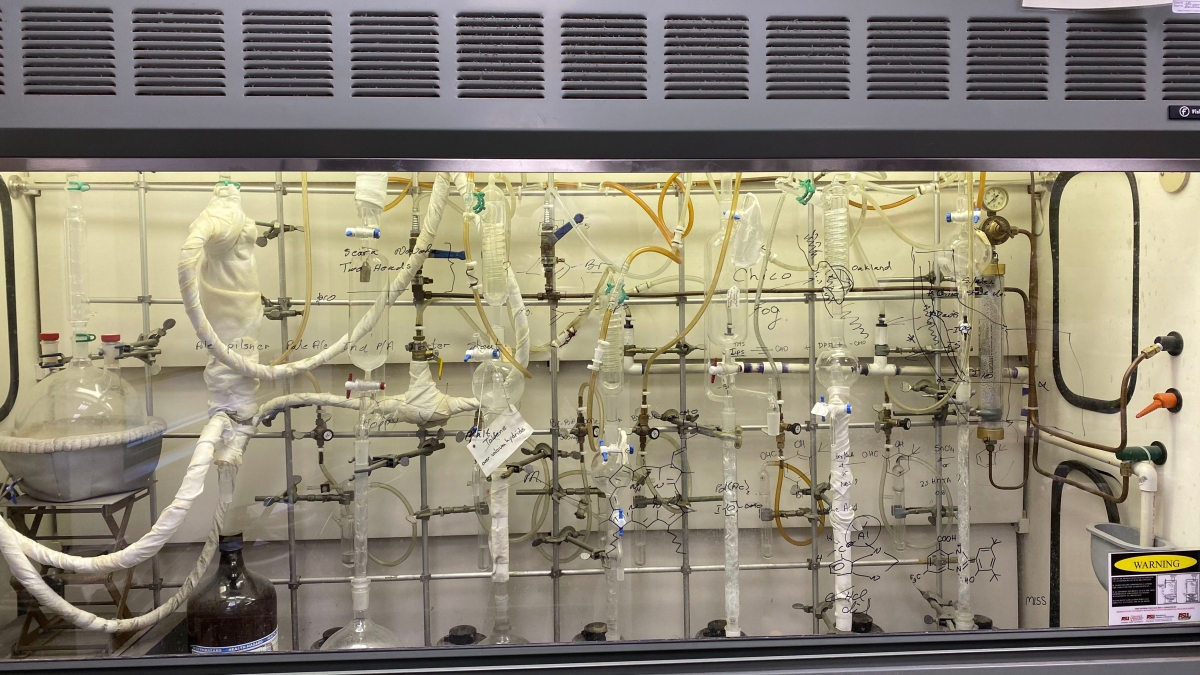Arizona State University employs many unsung heroes, like Paul Liddell, who devote their lives and careers not only to research, but to helping others. Liddell, an associate research professional in the School of Molecular Sciences, died in late February.
Liddell, a native of New Zealand, came to ASU for his graduate work in chemistry in the early 1980s, initially working with George Pettit. Later, in 1986, under the direction of Devens Gust, Liddell earned his PhD as a synthetic organic chemist specializing in photosynthetic systems with an emphasis on porphyrins and carotenoids, key photosynthetic compounds. Liddell was hired by the ASU Center for Early Events in Photosynthesis, where he continued to work with Gust, the Moore research group and many other researchers who sought out his expertise in synthetic chemistry.
Throughout his career, Liddell contributed to many important scientific discoveries. He designed and prepared extremely complex multi-component molecules containing several chromophores, electron donors and/or acceptors, and photochromic switching units. These molecular constructs included artificial reaction centers that absorb light and store the resulting energy, and molecular antennas that can trap light and make it available for conversion to electrochemical energy.
“Paul was a synthetic powerhouse," Gust said. "His molecular preparations were studied by spectroscopists and electrochemists at ASU and in collaborating laboratories around the world.”
Among the many molecules prepared by Liddell were some that were examined collaboratively at ASU and Oxford University, which helped uncover the hitherto unknown mechanisms by which birds navigate using Earth’s magnetic field. While at ASU, Liddell coauthored approximately 100 publications, including several in Nature and the Proceedings of the National Academy of Sciences¸ and many in the Journal of the American Chemical Society.
Throughout his career, Liddell willingly shared his expertise with others, mentoring a steady stream of undergraduates, graduate students and postdoctoral associates in synthetic chemistry.
Postdoctoral associates who worked closely with Liddell observed, “He was always willing to help us with difficult procedures or designing synthetic alternatives related to our projects. He was always sharing his experiences as well as encouraging us with valuable discussions and kind words.”
“Paul Liddell showed me how chemists conduct themselves safely in laboratories," said John Crozier, ASU senior compliance officer. "I learned from Paul much about health and safety, particularly as it pertained to handling high risk chemicals.”
Ian Gould, interim director of the School of Molecular Sciences, observed that Liddell was very much appreciated as a colleague who was very friendly and generous with his time and expertise.
“Paul will be remembered not just for his hard work and outstanding scientific contributions, but as a kind, gentle and much-liked person who in his own low-profile way contributed much to the culture and scientific reputation to the School of Molecular Sciences," Gould said.
More Science and technology

ASU to host 2 new 51 Pegasi b Fellows, cementing leadership in exoplanet research
Arizona State University continues its rapid rise in planetary astronomy, welcoming two new 51 Pegasi b Fellows to its exoplanet…

ASU students win big at homeland security design challenge
By Cynthia GerberArizona State University students took home five prizes — including two first-place victories — from this year’s…

Swarm science: Oral bacteria move in waves to spread and survive
Swarming behaviors appear everywhere in nature — from schools of fish darting in synchrony to locusts sweeping across landscapes…


